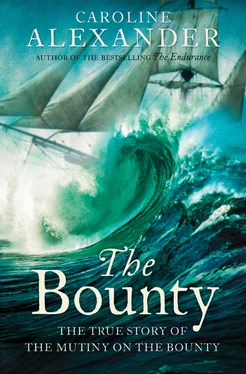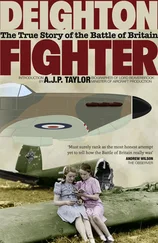Crowded in their own quarters, the Bounty ’s men stoked the galley stove that both dried their wet clothing and filled the air with choking smoke. The entire company was again on two-thirds rations of bread, or unpalatable hardtack, sensibly so, as the remainder of the voyage was unpredictable. In accordance with naval regulations, the men would receive monetary compensation for such reductions on return to England.
Now nine months out, friendships and factions had been formed. Among the young gentlemen, Peter Heywood and George Stewart had become firm friends. Fletcher Christian and young Heywood also had so much in common it was natural they too sought each other out, and Christian appears to have taken Heywood under his wing, helping him, Heywood claimed, with his mathematical and classical studies. Heywood was greatly admiring of his older friend, who had impressed the entire company with his athletic feats: Christian could balance a musket on the palm of his outstretched arm and could make a standing jump from inside one barrel to another. Of the first ship on which he had served, the Eurydice , it had been reported to Christian’s family that the young man had ruled over his inferiors ‘in a superior pleasant Manner’, that he had made ‘Toil a pleasure’; Christian’s stint before the mast under Bligh in the West Indies may have enhanced his instinctive, easy dealings with the lower deck, and all evidence suggests he was well liked on the Bounty .
In accordance with naval custom, and as Cook had done in turn for him, Bligh had his young gentlemen and other officers join him in rotation at his table. The habit was to be somewhat revised on this last leg.
‘During this passage Mr. Bligh and His Mess mates the Master & Surgeon fell out, and seperated,’ wrote Morrison, with his infallible eye for trouble, ‘each taking his part of the stock, & retiring to live in their own Cabbins, after which they had several disputes & seldom spoke but on duty; and even then with much apperant reserve.’ When Bligh invited his young gentlemen to dine, they joined his solitude.
The causes of the disputes with Fryer and the disagreeable Huggan are described at length by Bligh in his private and official logs. On the morning of 9 October, as the Bounty cut through a rare smooth sea, Bligh sent the ship’s several expense books to Fryer for the master’s usual bimonthly inspection and signature. The books were shortly returned to Bligh accompanied by a certificate drafted by Fryer, ‘the Purport of which,’ Bligh recorded, ‘was that he had done nothing amiss during his time on board.’ Unless Bligh signed the certificate, Fryer would not sign the books.
Summoning the master, Bligh informed him that he ‘did not approve of his doing his duty conditionally,’ at which Fryer abruptly left. This time, Bligh’s instincts were sure and his reaction swift. Ordering all hands on deck, he read the Articles of War, ‘with particular parts of the Instructions relative to the Matter.’ Fryer was instructed to sign the books or ‘express his reasons [for not complying] at full length at the bottom of the Page.’
‘I sign in obedience to your Orders, but this may be Cancelled hereafter,’ Morrison reported that Fryer intoned as he signed. Morrison’s sly suggestion was that Bligh had been caught fiddling the books, which if true would have cost him his career. But his very public actions defy this interpretation: Bligh was not about to countenance a furtive quid pro quo with his Master. ‘This troublesome Man saw his error & before the whole Ships Company signed the Books’ was Bligh’s report.
There are indications that Fryer might have had reason for concern about his performance as master – Bligh’s glancing reference to his need to repeat orders about Purcell at Adventure Bay being one. More immediately, Fryer may have had in mind the events of just three days earlier – events Bligh described with shock and anger in his private log but omitted in the official log he presented to the Admiralty.
On this day, William Elphinstone, one of the master’s mates, came to Bligh with wholly unexpected news: James Valentine, a twenty-eight-year-old able seaman, had incurred a bad infection after being bled by surgeon Huggan for an ailment contracted at Adventure Bay. Bligh was informed that Valentine was delirious ‘and had every appearance of being in a dying state.’
‘This shock was scarce equal to my astonishment,’ Bligh almost gasped, ‘as the Surgeon had told me he was getting better, and had never expressed the least uneasyness about him.’ When summoned, Huggan explained that, oh yes – he had meant to tell Bligh the night before at dinner, only Bligh had a guest (the officer of the watch) and he had not thought it proper to say anything at the time, but, yes, it was true: James Valentine had only hours to live.
Where was the ship’s master? Where was the acting lieutenant? Above all, where was the assistant surgeon? How had it transpired that Bligh had only learned, belatedly and almost by happenstance, of so serious a development? Bligh immediately visited the stricken man, who was ‘seized with a violent hollow Cough and spit much.’ He had been treated by Huggan with blisters, applied to his breast, for what the surgeon had diagnosed as an asthmatic complaint.
On 10 October, the day after the altercation with Master Fryer, Bligh recorded the death of Seaman Valentine in his official log.
‘This poor man was one of the most robust People on board,’ he reflected, ‘and therefore the Surprize and shock was the greater to me.’ Forgoing the customary auction of the deceased man’s effects, Bligh directed that his meagre possessions be given to the two men who had cared for him on his deathbed ‘with great care and Affection.’ On the following day, as the ship progressed under light breezes and fine rain, Valentine’s remains were committed to the deep.
Bligh’s perfect record of health was now irrevocably spoiled, and it had been spoiled by his beastly sot of a surgeon, aided by the apparent indifference of his officers. Four days after Valentine’s death, three of the older seamen who had formerly complained of ‘the Rheumatism’ were diagnosed with symptoms of scurvy. Bligh was beside himself with frustration and disbelief; had he himself not written in his dissertation on the healthful ‘Mode of Management’ that ‘the Scurvy is realy a disgrace to a ship’?
Bligh embarked upon a frantic application of his most trusted defences – portable soup and essence of malt, the latter served at a ratio of three tablespoons to a quart of water, ‘this being the Surgeons opinion was sufficient’; despite his misgivings and distaste for Huggan, Bligh was still dependent on his professional opinion, such as it was.
Was it scurvy, or was it something else? Throughout the rest of the voyage, all the way to Tahiti, the question hounded Bligh, who returned to it again and again in his log. On 17 October, he dosed up the three men who had complained of rheumatism with malt, sauerkraut, and less usefully, vinegar and mustard – everything, it would seem, that he could think of. The next day he examined other men ‘who the Doctor supposed had a taint of the Scurvy’ but found only the symptoms of prickly heat. The Bounty was now back up to the twenty-fifth parallel, after all, and temperatures had risen well into the seventies.
On the afternoon of the nineteenth, as the ship ambled along in fair but windless weather, John Mills, the forty-year-old gunner’s mate from Aberdeen, and William Brown, the assistant gardener, refused to participate in the mandatory evening dancing. Perhaps the higher temperature was taking a toll, or perhaps the men were just fed up with what they regarded as tedious nonsense. On being informed, Bligh’s response was to stop the offenders’ grog, ‘with a promise of further punishment on a Second Refusal’; the stopping of grog had been one of Cook’s stratagems.
Читать дальше












